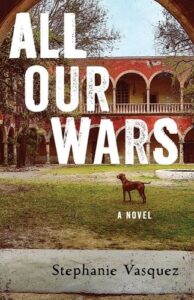When the idea of writing the story of a woman forced to head the family drug business she despises first came to me, I was apprehensive. How could I tell the story of family run drug cartel while being respectful to Mexico, its citizens, and those hurt by the decades long war on drugs? Would I be doing more harm than good? But the more I researched the long history of drug trafficking, the more I decided to lean into it.
Breaking Bad, Queen of the South and Narcos were all wildly popular TV shows, so if the general public wanted to see drug trafficking stories, then why not give it to them in the form of a novel? The caveat would be to use the story as a way to highlight the United States’ role and the politics involved with drug trafficking, much like Netflix’s Narcos and Queen of the South have. Because what this unimaginably complex problem boils down to, is the United States has lost the war on drugs. And in its trillion-dollar wake, fifty plus years later, the war has destroyed some of the lives it claimed it wanted to save while also disproportionately incarcerating people of color and creating a dangerous rhetoric regarding immigrants and the United States southern border. Sofia De Luna’s story is one that explores the what ifs of someone wanting to break free from the cycle of drug trafficking and violence and the obstacles that stand in the way.
I was lucky enough to attend public school during a time when we were taught about the history of Arizona and the land it was built on. Those history lessons sparked my interested in Mexico, its border only an hour away from where I grew up in Southern Arizona. Tucson is a city that embraces the cultural diversity and richness of a shared border. The city is dotted with churches built in the colonial style of Spanish missionaries and while growing up, I learned how those same missionaries chipped away at indigenous people’s lives, beliefs and land. I grew up in a city that was half this, half that. While I myself was half this, half that.
I always knew I was a mixed-race child, half-white, half-Latina, so while earning a bachelor’s degree in journalism with a minor in Latin American studies at the University of Arizona, I had the opportunity to learn more about the half of me I knew little about. This sparked my interest, and respect, for the country I grew up so close to. The country whose traditions, food and culture had been brought north by immigrants and openly and warmly shared. But it wasn’t until taking a DNA test in my late 30’s that the depth of my connection to Southern Mexico was revealed, deepening my desire to learn more about the history of Mexico. A history that is scarred and shared with the United States, like many Latin American countries.
All Our Wars is a story of ‘what ifs?’, one of those what if’s being- what if a man fleeing a war to save his family runs right into another?
In my Latin American history classes, the pattern of the instability of governments in Latin American countries in the 70’s and 80’s was apparent. As was the United States involvement in these histories.
All Our Wars is a dual-timeline novel, following Sofia’s parents at the tail end of Argentina’s Dirty War, which saw an estimated 30,000 people disappear due to government sanctioned actions that sent families fleeing the country to seek asylum. The legacy of this war are the children who were born in camps and were never returned to their families. In 2003, documents were released which underlined the United States support at the time for the dictatorship.
In All Our Wars, Sofia’s father leaves his home country of Argentina to escape the violence, only to cultivate and profit from violence later on. Another character’s mother similarly leaves battle torn Guatemala for Mexico hoping to give her son some security and a sense of safety, but she is killed by Sofia’s father. The point of highlighting this type of violence is to show readers these systems have been in place for generations and they are cyclical. Even something as human as wanting a better life is not an easy pursuit.
The Lost War on Drugs and Its Repercussions
When talking about The War on Drugs, The United States’ legacy is often overlooked on the north side of the border. With a 41 billion with a B budget in 2022, drug use in the United States is still reported to be on the rise. The lasting legacy of this war seeming to be mass incarcerations that disproportionately affect minorities and throwing more people into jail hasn’t worked so far for either country. The jails both in the U.S. and Mexico are vastly overcrowded. More incarcerations also mean more court cases tying up resources. Even the people of the United States have seemingly given up on this war.
Per a civilrights.org article, 83 percent of Americans polled believe The War on Drugs has failed and 66 percent are in favor of eliminating criminal charges for drug possession all together.
This failed war hasn’t stopped certain types of politicians from attempting to paint a picture of the need for bolstering security for Americans in the form of a border wall—a bigger, better, stronger one—as the only thing keeping our children safe. When, in reality, the majority of crossers are desperate families crossing the border to flee complex violent issues in their home countries.
Growing up near the border I have never understood the venom held for those that make the dangerous choice to cross the border. Pushing laws and politics aside, the Southern Arizona landscape, where temperatures reach, and stay, north of 100 degrees for weeks on end, is unforgiveable. There are also human coyotes making wild promises to would-be border crossers just to turn a profit. Families that are crossing that terrain, in hellish conditions, are not doing so because it was their first choice. While we can’t ignore the demand on U.S. cities and their resources as growing numbers of immigrants make their way north of the border, cruelty isn’t the answer. Neither is sending the U. S. military in to Mexico to fight cartels.
All Our Wars was never meant to be a simple black and white story of wrong and right because drug trafficking, and all its iterations, is not that simple. My what if when writing Sofia’s story was this, what if someone on the inside wanted to change the narrative, of their family, of their country? Was it possible? The thought behind this idea was finding a way to show the world that this issue runs much deeper than the sound bites heard on TV from people who have never even visited Mexico.
Sofia, like her mother before her, loves Mexico, they love their home, and they love the people of their country. They want better for themselves, for their family, for the country. They each were inspired by their own ‘what if’s?’ because they saw what their families’ choices were doing to their nation, the violence that came with the drug business and the way it destroyed lives. The women in the De Luna family are dreamers. They are fierce protectors of their families, however they are also realistic. The drugs fund their family’s lifestyle, but apart from that, the drugs, and the power the money brings with it, protects their family from the same violence they want to curb.
I wanted to examine The War on Drugs in a way that does not paint one country or the other as the good guy or bad guy. Sofia’s story was a way to explore not only how insidious the cartels are, but how many arms of daily life drug culture touches – churches, politicians, economics, agriculture. The list goes on. How do you rip out a cancer that’s spread into bones and nerves? As Sofia finds in her journey, the answers aren’t easy. She feels responsibility because of who her family is. But the government officials she runs into, based on both sides of the border, have their own agendas as well.
As Sofia says, there is more to Mexico than drugs and violence. There are writers out there who tell beautiful stories about Mexico. Please consider reading their work. It might change how you feel when those news clips scream about dangerous immigrants.
I am no expert in foreign policy by any means, but if you have further interest in the topic, I cannot recommend the following books enough: The Line Becomes a River by Francisco Cantú, an ex-border patrol agent who wrote about his time on the border, and Narconomics by Tom Wainwright, which explores the business behind drugs and how the cartels have become corporations.
Through Sofia I was able to journey through my own history and I hope readers will do the same.
***


















